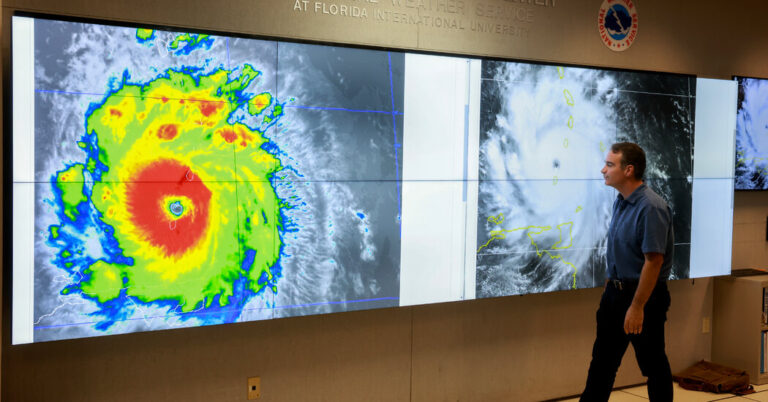Hurricane Beryl was heading west toward Jamaica as a Category 5 storm early Tuesday morning, hours after leaving a trail of destruction across the southeastern Caribbean and killing at least two people, authorities said.
Beryl strengthened to Category 5 storm As of Monday night, the wind was blowing at a maximum speed of 253 km/h. The U.S. National Hurricane Center said it would continue to make its way across the Caribbean, reaching Jamaica with potential hurricane conditions by Wednesday.
Major hurricanes have maximum sustained winds of 111 mph or greater on a five-tier scale that was developed in the 1970s. No Atlantic storm has ever reached Category 5 strength this early in the season, according to Philip Klotzbachmeteorologist at Colorado State University specializing in tropical cyclones.
Typhoon Beryl struck several Caribbean islands on Monday, and two deaths were later reported in Grenada and St. Vincent and the Grenadines.
The storm made landfall Monday morning on Carriacou, a small island north of Grenada, and “flattened” the island in just half an hour, Grenada Prime Minister Dickon Mitchell said in a briefing broadcast on social media. Government officials also expect “extreme” damage on the neighboring island of Petite Martinique.
One death has been reported in St. George’s, the capital of Grenada, after a tree fell on a house. “This is personal to me,” Mitchell said. “The person who died is actually a relative of one of the people who spent the last 36 hours with us here at the National Emergency Operations Centre.”
North of Carriacou, several islands in St. Vincent and the Grenadines have also suffered “immense destruction,” Prime Minister Ralph Gonsalves said in a social media briefing. One death was reported and hundreds of homes, schools and churches were badly damaged, he added.
An estimated 90 percent of homes on Union Island were severely damaged or destroyed, and similar levels of destruction are expected on Mayreau and Canouan islands, Gonsalves said.
Beryl, the first Atlantic hurricane of the season, left a trail of destruction when it made landfall: snapped trees, a major storm surge and torn-off roofs. Winds reached over 150 miles per hour.
In Grenada, the full extent of the damage in Carriacou and Petite Martinique will not be known until Tuesday morning, Prime Minister Mitchell said, adding that he would travel to Carriacou as soon as it was safe to do so. There was no electricity in Carriacou and Petite Martinique, and communications were difficult, officials said.
Damage was also reported in the capital as the storm passed over the main island. A police station had its roof torn off and a hospital had to evacuate patients to a lower level after its roof was damaged.
Beryl was an anomaly in an already unusually busy storm season that extends through late November. When it strengthened into a Category 4 storm on Sunday, it was the third major hurricane ever seen in the Atlantic Ocean in June — and the first time a Category 4 hurricane had materialized so early in the season.
The storm was also historic because of how short it lasted. The hurricane intensified in 42 hours from a tropical depression to a major hurricane, a direct result of above-average sea surface temperatures. This rapid escalation is a feat recorded only six other times in Atlantic hurricane history.
Barbados authorities said Monday that the island had been spared the worst of Beryl.
Barbados Prime Minister Mia Mottley said in a national broadcast from the island’s emergency operations centre that as many as 20 fishing boats, including two popular cruise ships, had likely sunk. “It could have been a lot worse for us,” she added.
Mottley said about 40 homes have suffered roof or structural damage so far, but that number is expected to rise as more than 400 residents return home from shelters.
Residents in the eastern Caribbean had begun preparing for the storm over the weekend, including those making last-minute purchases for supplies.
“Hurricanes are not something we take lightly as a family,” said Fleur Mathurin, who lives in St. Lucia, where parts of the island have experienced power outages. “My family, my grandmothers and my great-grandchildren, have been through Hurricanes Allen and Gilbert, and it’s something they tell us over and over again.”
Julius Gittens contributed to this report from Christ Church, Barbados; Linda Straker from Gouyave, Grenada; Kenton X. Chance from Kingstown, St. Vincent; Sharefil Gaillard from Gros Islet, St. Lucia; and Maria Abi-Habib from Mexico City.


